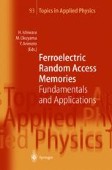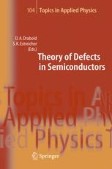Search
Search Results
-
Overview
A review on ferroelectric thin films used for nonvolatile random access memories is given. Particular attention is paid to fundamental...
-
Capacitor-on-Metal/Via-Stacked-Plug (CMVP) Memory Cell Technologies and Application to a Nonvolatile SRAM
A capacitor-on-metal/via-stacked-plug (CMVP) memory cell was developed for the 0.25 micr meter CMOS logic embedded FeRAM. Using a 445 C MOCVD...
-
Novel Si-Substituted Ferroelectric Films
In this chapter, properties of novel Si-substituted ferroelectric films are presented. The films are a solid solution between Bi...
-
The Application of FeRAM to Future Information Technology World
The future information technology world needs a simple identification and secure information storage medium. The advanced smart card is a...
-
A Chemical Approach Using Liquid Sources Tailored to Bi-Based Layer-Structured Perovskite Thin Films
The electrical properties of Bi-based layer-structured perovskite compounds strongly depend on their anisotropic crystal structure. Because of...
-
High-Density Integration
Ferroelectric random access memory (FeRAM) has been pursued as a promising new memory due to its ideal memory properties, such as fast random...
-
The Sputtering Technique
In this chapter, the formation of ferroelectric films using the sputtering technique is described. A main topic is a mass production system...
-
Empirical Molecular Dynamics: Possibilities, Requirements, and Limitations
Classical molecular dynamics enables atomistic structure simulations of nanoscopic systems to be made. The method is extremely powerful in solving...
-
Defect Theory: An Armchair History
This introductory chapter begins with a summary of the developments of the theory of defects in semiconductors in the past 50 years. This is followed...
-
Quasiparticle Calculations for Point Defects at Semiconductor Surfaces
We present a quantitative parameter-free method for calculating defect states and charge-transition levels of point defects in semiconductors. It...
-
Light Induced Effects in Amorphous and Glassy Solids
In this Chapter, we discuss how exposure to light can affect the properties of disordered materials and review our recent computational studies of...
-
Defects in Amorphous Semiconductors: Amorphous Silicon
Defects in disordered (amorphous) semiconductors are discussed, with an emphasis on hydrogenated amorphous silicon. The general differences between...
-
Dynamical Matrices and Free Energies
The calculation of the entire dynamical matrix of a periodic supercell (containing a defect or not) provides several most useful pieces of...
-
Multiscale Modeling of Defectsin Semiconductors:A Novel Molecular-Dynamics Scheme
Now that the modeling of simple semiconductor systems has become reliable, accurate and routine, attention is focusing on larger scale, more complex...
-
Supercell Methods for Defect Calculations
Periodic boundary conditions enable fast density-functional-based calculations for defects and their complexes in semiconductors. Such calculations...
-
Charge Transport and Catalysis by Molecules Confined in Polymeric Materialsand Application to Future Nanodevices for Energy Conversion
Polymeric materials confining functional molecules are one of the most promising materials for designing nanodevices for energy conversion, e.g.,...
-
Chain \protect\mbox{FeRAMs}
A chain FeRAM (TM) is a solution for future high-density and high-speed nonvolatile memory. One memory cell consists of one transistor and one...
-
Recent Development in the Preparation of Ferroelectric Thin Films by MOCVD
Recent research by our group, concerned with the preparation of ferroelectric thin films by MOCVD, is summarized. MOCVD has been investigated as a...
-
Spiro Compounds for Organic Electroluminescence and Related Applications
A comprehensive review about functional spiro compounds, their synthesis, physical properties and applications in optoelectronic devices is given.
-
Polyphenylene-type Emissive Materials: Poly(para-phenylene)s,Polyfluorenes, and Ladder Polymers
This ‘chapter’ reviews the synthesis of the various classes of polyphenylene-based materials that have been investigated as active materials in...
